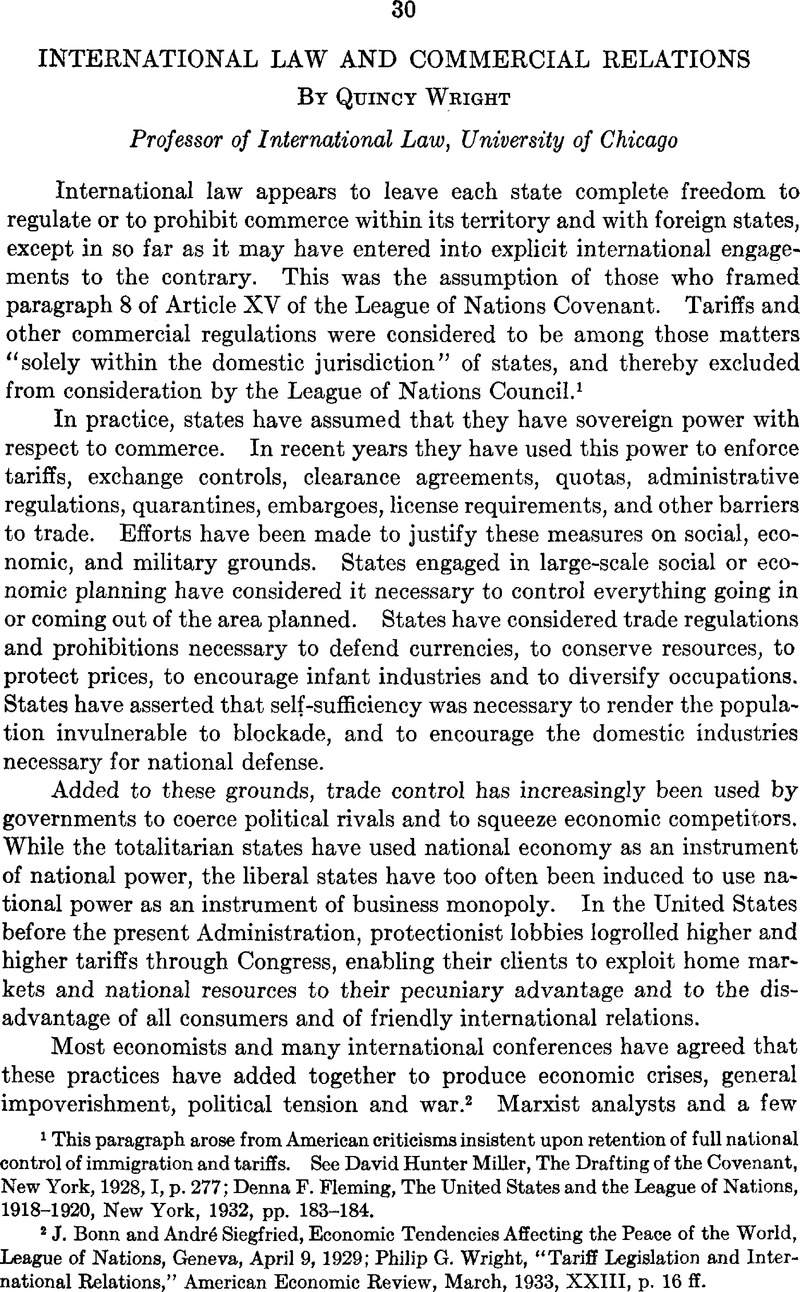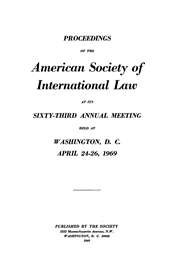No CrossRef data available.
Article contents
International Law and Commercial Relations
Published online by Cambridge University Press: 27 February 2017
Abstract

- Type
- Second Session
- Information
- Copyright
- Copyright © American Society of International Law 1941
References
1 This paragraph arose from American criticisms insistent upon retention of full nation al control of immigration and tariffs. See Miller, David Hunter, The Drafting of the Covenant, New York, 1928,1, p. 277 Google Scholar; Fleming, Denna F., The United States and the League of Nations, 1918-1920, New York, 1932, pp. 183-184 Google Scholar.
2 Bonn, J. and Siegfried, André, Economic Tendencies Affecting the Peace of the World, League of Nations, Geneva, April 9, 1929 Google Scholar; Wright, Philip G., “Tariff Legislation and International Relations,” American Economic Review, March, 1933, XXIII, p. 16 ffGoogle Scholar.
3 Robbins, Lional, The Economic Causes of War, London, 1939 Google Scholar; Viner, Jacob, “Political Aspects of International Finance,” The University of Chicago, Journal of Business, April, July, 1928 Google Scholar; Southwestern Political and Social Science Quarterly, March, 1929; Hawtrey, R. G., Economic Aspects of Sovereignty, London, 1930 Google Scholar; Lippmann, Walter, The Good Society, Boston, 1937 Google Scholar; Staley, Eugene, “Foreign Investment and War,” Public Policy Pamphlet No. 18, Chicago, 1935 Google Scholar; von Hayek, Friedrich A., “Freedom and the Economic System,” ibid. , No. 29, Chicago, 1939 Google Scholar.
4 Robbins, op. cit., p. 74 ff.
5 For summary of the economic activities of the League of Nations, see McClure, Wallace, World Prosperity as Sought Through the Economic Work of the League of Nations, New York, 1933 Google Scholar.
6 Hornbeck, Stanley K., “Most-favored-nation Clause,” Am. Jour. Int. Law, Vol. 3 (1909), pp. 395,619,797Google Scholar; Viner, Jacob, “The Most-favored-nation Clause,” Index, Jan. 1931, VI, pp. 2-17 Google Scholar.
7 Heckscher, Eli F., “Mercantilism,” Encyclopaedia of the Social Sciences Google Scholar.
8 Littauer, Rudolph, “Enemy Property in War,” in Speier, Hans and Kahler, Alfred, Eds., War in Our Time, New York, 1939, p. 284 ff.Google Scholar; Friedman, W., “State Control and the Individual,” British Year Book of International Law, 1938, p. 118 ff.Google Scholar; Fox, W. T. R., “Some Effects upon International Law of the Governmentalization of Private Enterprise” (Mss. thesis), University of Chicago, 1940 Google Scholar.
9 Kuhn, Arthur K., “Tariff as a Matter of International Concern,” Am. Jour. Int. Law, Vol. 23 (1929), pp. 816-819; United States Foreign Relations, 1865-66, II, p. 332; 1868, p. 8; 1883, p. 895; 1886, p. 739; 1897, p. 359; 1905, p. 45; Sen. Com. on Finance, Hearings on House Resolution 2667, 71st Cong., IstSess., Vol. XVIII, Foreign Comments, Washington, 1929CrossRefGoogle Scholar.
10 Morse, H. B. and MacNair, H. F., Far Eastern International Relations, New York, 1931, pp. 89, 297, 382Google Scholar; Francisco de Vitoria, op. cit., infra note 19; Day, Clive, A History of Commerce, London, 1907, p. 437 Google Scholar.
11 Simpson, Janice C., “The Position in International Law of Economic Measures of Coercion Carried on Within a State’s Territory” (Mss. thesis), University of Chicago, 1935, p. 12 Google Scholar.
12 Bailey, S. H., “The Political Aspect of Discrimination in International Economic Relations,” Economica, May, 1932, p. 164 Google Scholar.
13 Manchester Guardian, Sept. 13, 1932, quoted in “An American Foreign Policy Toward International Stability,” Public Policy Pamphlet, No. 14, University of Chicago Press, 1934, p. 46.
14 Public Policy Pamphlet, No. 14, University of Chicago Press, 1934, p. 45.
15 Harvard Research in International Law, Draft Convention on Responsibility of States, Art. 7, Am. Jour. Int. Law, Spl. Supp., Vol. 23 (1929), pp. 157-161.
16 Bouvé, C. L., Am. Jour. Int. Law, Vol. 28 (1934), p. 19 ffCrossRefGoogle Scholar.
17 Borchard, E. M., Diplomatic Protection of Citizens Abroad, New York, 1919, pp. 181-183 Google Scholar.
18 Staley, Eugene, “War Losses to a Neutral,” League of Nations Association Pamphlet, Washington, Dec. 1937, pp.27, 67Google Scholar.
19 de Vitoria, Francisco, Relectiones: De Indis and de Jure Belli , Washington, Carnegie Institution, 1917, I, Sec. III, Nos. 3(1), 6 Google Scholar.
19a Grotius, Hugo, The Freedom of the Seas, New York, 1915, p. 61 Google Scholar.
20 Grotius, Hugo, De Jure Belli ac Pads, Washington, Carnegie Endowment for International Peace, 1925, II, c. ii, Sees. 19, 22, 24Google Scholar.
21 Zouche, Richard, Juris et Judicii Fecialis , Washington, Carnegie Institution, 1911, II, c. v, 9 Google Scholar.
22 Pufendorf, Samuel, Elementorum Jurisprudentiae Universalis , Washington, Carnegie Endowment for International Peace, 1931, I, c. v, Sec. 33 Google Scholar.
23 Vattel, Emerich, Droit des Gens , Washington, Carnegie Institution, 1911, I, c. viii, Sec. 90; II, c. ii, Sec. 25Google Scholar.
24 Textor, Johann, Synopsis Juris Gentium , Washington, Carnegie Institution, 1916, XIII, Sec. 45Google Scholar.
25 Rachel, Samuel, De Jure Naturae et Gentium , Washington, Carnegie Institution, 1916, II, Sec. 118Google Scholar.
26 von Martens, G. F., A Compendium of the Law of Nations, London, 1802, IV, c. iii, Sec. 2Google Scholar.
27 See Simpson, Janice, op. cit. , p. 21 Google Scholar, citing Calvo, Halleck, Fiore, Phillimore, Geffcken, Bluntschli, Pradier-Fodéé, Klueber, Heilborn, Hershey, Merignhac, Nys, Pomeroy, Rivier, Waldkirck, Neumann, Heffter, Gareis. Kent and Pillet belong in this list, and see especially Stowell, Ellery, International Law, New York, 1935, p. 137 ffGoogle Scholar.
28 Bluntschli, J. K., Le Droit International , Paris, 1895, p. 28 Google Scholar.
29 Halleck, H. W., International Law, London, 1906, p. 94 Google Scholar.
30 Hershey, Amos, Essentials of International Public Law and Organization, New York, 1927, Sec. 148Google Scholar.
31 See Simpson, Janice, op. cit. , p. 18, citing Creasy, Fauchille, Hall, Liszt, Oppenheim, Woolsey. Liszt (Das Voelkerrecht, Berlin, 1918) states: “From the sovereignty of the state follows also the autonomy of its commercial policy” (Sec. 28, I) but he admits some qualifications: “A state which should attempt to separate itself from all other states by a Chinese wall would remove itself from membership in the society of states. A state that refuses to allow to one state the commerce which it opens to all others affords the latter a ground for war. Therefore the economic boycott is inconsistent with the fundamental principles of international law. The application of this fundamental obligation relative to the maintenance of commerce does not affect the right of a state in particular cases to refuse to conclude a treaty, or to receive an embassy or to admit certain citizens.” (Sec. 7, IV.)Google Scholar
32 Oppenheim, L., International Law, 5th ed. (Lauterpacht), London, 1935, I, Sec. 124Google Scholar.
33 Simpson, Janice, op. cit. , p. 23 Google Scholar.
34 As in the Sicilian sulphur monopoly case (Br. and For. St. Papers, XXX, pp. 111-120. See also Savage (U. S.) v. Moore, Salvador J. B., International Arbitrations, p. 1855; Borchard, op. cit., p. 182Google Scholar.
35 Borchard, ibid.
35a Preliminary Report of the Commission to Study the Organization of Peace, International Conciliation, No. 369, April, 1941, p. 201.
36 Supra, notes 12, 13, 14.
37 H. G. Wells includes in his formulation of “The Rights of Man”: “4. That he shall have the right to buy or sell without any discriminatory restrictions anything which may be lawfully bought or sold, in such quantities and with such reservations as are compatible with the common welfare.” Union, Monthly Digest of the New Commonwealth Institute, January, 1940, p. 25.
38 P. Fiore (Nouveau Droit International Public, Sees. 680, 697); F. de Martens (Traité de Droit International, Paris, 1883, Sees. 53, 84, 85); W. Kaufmann (Die Rechtskraft des internationales Rechtes, Stuttgart, 1899, p. 3 ff), and others insist that there are rights of world citizenship in respect to which individuals are subjects of international law. See also E. M. Borchard, op. cit., pp. 14-18; Clyde Eagleton, The Responsibility of States in International Law, New York, 1928, p. 221 ff; Nicolas Politis, The New Aspects of International Law, Washington, 1928, p. 23; Q. Wright, Research in International Law since the War, Washington, 1930, p. 32; Salvador de Madariaga, The World's Design, London, 1938, pp. xix, 268 ff; World Citizens Association, A Platform of World Citizenship, Chicago, 1939.
39 Huston Thompson has proposed an International Trade Tribunal. Proc. Am. Soc. Int. Law, 1940, p. 1 ff. Eugene Staley has suggested a world investment commission and a world commercial court, as well as international corporations, a world investment bank and a world consular service. War and the Private Investor, New York, 1935, p. 498 ff. See also his World Economy in Transition, New York, 1939.
40 The League of Nations Economic Organization was based upon the clause in Art. 23(e) of the Covenant by which the members “will make provision to secure and maintain … equitable treatment for the commerce of all members of the League.” The activities of this organization are summarized in Essential Facts about the League of Nations, Geneva, 1936, pp. 167-177; D. P. Myers, Handbook of the League of Nations, Boston, 1935, pp 145-167; Secretariat of the League of Nations, The Aims, Methods and Activity of the League of Nations, Geneva, 1935, pp. 130-140; Wallace McClure, op. cit.
41 Sayre, Francis B., The Protection of American Export Trade, Chicago, 1940 Google Scholar.
42 General treaties negotiated under League of Nations auspices covered such subjects as simplification of customs formalities, uniform law of bills of exchange, import and export prohibitions and restrictions, tariff nomenclature, and arbitration of commercial disputes. See citations, supra, note 40.




